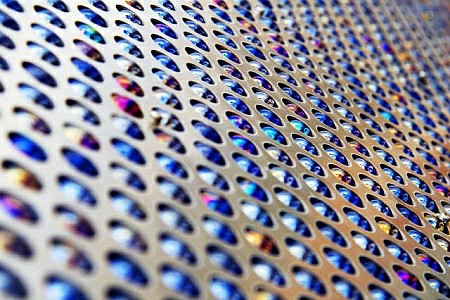[新译林版3Aunit2教学反思]工作已将近一个月了,唯一让我觉得有点欣慰的是:学生熟悉得差不多了,一个班中的绝大部分学生我能叫得出名字,但是在教学过程中仍是有许多问题存在。1.课堂纪律的掌控这个问题其...+阅读
Do you want a better life? According to the author of the following article, the solution is easy. Simply change the way you look at yourself - and you will change the way you live. Improving your self-image is your key to living a better life.
Your Key to a Better Life
by Maxwell Maltz
The most important psychological of this century is the discovery of the "self-image." Whether we realize it or not, each of us carries about with us a mental blueprint or picture of ourselves. It may be vague and ill-defined to our conscious gaze. In fact, it may not be consciously recognizable at all. But it is there, plete down to the last detail. This self-image is our own conception of the "sort of person I am." It has been built up from our own beliefs about ourselves. But most of these beliefs about ourselves he unconsciously been formed our past experiences, our successes and failures, our humiliations, our triumphs, and the way other people he reacted to us, especially in early childhood. From all these we mentally construct a "self," (or a picture of a self). Once an idea or a belief about ourselves goes into this picture it bees "true", as far as we personally are concerned. We do not question its validity, but proceed to act upon it just as if it were true.
This self-image bees a golden key to living a better life because of two important discoveries:
1. All your actions, feelings, behior —— even your abilities —— are always consistent with this self-image.
In short, you will "act like" the sort of person you conceive yourself to be. Not only this, but you literally cannot act otherwise, in spite of all your conscious efforts or will power. The man who conceives himself to be a "failure type person" will find some way to fail, in spite of all his good intentions, or his will power, even if opportunity is literally dumped in his lap. The person who conceives himself to be a victim of injustice, one "who was meant to suffer" will invariably find circumstances to verify his opinions.
The self-image is a "premise," a base, or a foundation upon which your entire personality, your behior, and even your circumstances are built. Because of this our experiences seem to verify, and thereby strengthen our self-images, and a vicious or a beneficent cycle, as the case may be, is set up.
For example, a schoolboy who sees himself as an "F" type student, or one who is "dumb in mathematics," will invariably find that his report card bears him out. He then has "proof". A young girl who has an image of herself as the sort of person nobody likes, will find indeed that she is oided at the school dance. She literally invites rejection. Her woebegone expression, her hang-dog manner, her over-anxiousness to please, or perhaps her unconscious hostility towards those she anticipates will affront her - all act to drive away those whom she would attract. In the same manner, a salesman or a businessman will also find that his actual experiences tend to "prove" his self-image is correct.
Because of this objective "proof" it very seldom occurs to a person that his trouble lies in his self-image or his own evaluation of himself. Tell the schoolboy that he only "thinks" he cannot master algebra, and he will doubt your sanity. He has tried and tried, and still his report card tells the story. Tell the salesman that it is only an idea that he cannot earn more than a certain figure, and he can prove you wrong by his order book. He knows only too well how hard he has tried and failed. Yet, as we shall see later, almost miraculous changes he occurred both in grades of students, and in the earning capacity of salesmen - when they were prevailed upon to change their self-images.
2. The self-image can be changed. Numerous case histories he shown that one is never too young nor too old to change his self-image and thereby start to live a new life.
One of the reasons it has seemed so difficult for a person to change his habits, his personality, or his way of life, has been that heretofore nearly all efforts at change he been directed to the circumference of the self, so to speak, rather than to the center. Numerous patients he said to me something like the following: "If you are talking about 'positive thinking', I've tried that before, and it just doesn't work for me." However, a little questioning invariably brings out that these individuals he employed "positive thinking," or attempted to employ it, either upon particular external circumstances, or upon some particular habit or character defect ("I will get that job." " I will be more calm and relaxed in the future." "This business venture will turn out right for me," etc.) But they had never thought to change their thinking of the "self" which was to acplish these things.
Jesus warned us about the folly of putting a patch of new material upon an old garment, or of putting new wine into old bottles. "Positive thinking" cannot be used effectively as a patch or a crutch to the same old self-image. In fact, it is literally impossible to really think positively about a particular situation, as long as you hold a negative concept of self. And, numerous experiments he shown that once the concept of self is changed, other things consistent with the new concept of self, are acplished easily and without strain.
One of the earliest and most convincing experiments along this line was conducted by the late Prescott Lecky, one of the pioneers in self-image psychology. Lecky conceived of the personality as a "system of ideas", all of which must seem to be consistent with each other. Ideas which are inconsistent with the system are rejected, "not believed," and not acted upon. Ideas which seem to be consistent with the system are accepted. At the very center of this system of ideas —— the keystone —— the base upon which all else is built, is the individual's "ego ideal," his "self-image," or his conception of himself. Lecky was a school teacher and had an opportunity to test his theory upon thousands of students.
Lecky theorized that if a student had trouble learning a certain subject, it could be because (from the student's point of view) it would be inconsistent for him to learn it. Lecky believed, however, that if you could change the student's self-conception, which underlies this viewpoint, his attitude toward the subject would change accordingly. If the student could be induced to change his selfdefinition, his learning ability should also change. This proved to be the case. One student who misspelled 55 words out of a hundred and flunked so many subjects that he lost credit for a year, made a general erage of 91 the next year and became one of the best spellers in school. A boy who was dropped from one college because of poor grades, entered Columbia and became a straight "A" student. A girl who had flunked Latin four times, after three talks with the school counselor, finished with a grade of 84. A boy who was told by a testing bureau that he had no aptitude for English, won honorable mention the next year for a literary prize.
The trouble with these students was not that they were dumb, or lacking in basic aptitudes. The trouble was an inadequate self-image ("I don't he a mathematical mind"; "I'm just naturally a poor speller"). They "identified" with their mistakes and failures. Instead of saying "I failed that test" (factual and deive) they concluded "I am a failure." Instead of saying "I flunked that subject" they said "I am a failure." Instead of saying "I flunked that subject" they said "I am a flunk-out." For those who are interested in leaning more of Lecky's work, I remend securing a copy of his book: self consistency, a Theory of Personality. The Island Press, Now York, N.Y.
NEW WORDS
blueprint
n. a design for a building or machine, with white lines on blue paper; a detailed plan or scheme
vague
a. not clear or distinct
ill-defined
a. not adequately explained; not well marked out; unclear
recognizable
a. that can be recognized, identifiable
conception
n. general understanding, idea; the act of forming an idea, plan, etc.
humiliation
n. the act or process of lowering pride, dignity or self-respect; the state or feeling of being humiliated
triumph
n. the act of winning; success
v. be victorious or successful
construct
vt. build or put together
validity
n. truth or soundness; legal force, being legally binding 正确;(法律上)有效
consistent
a. in agreement; keeping to the same principles and habits
consistency
n.
lap
n. the front part of a seated person between the waist and the knees
victim
n. a person harmed, killed or suffering some hardship or loss 受害者
injustice
n. lack of justice; an unjust act
verify
vt. prove to be true, confirm; check for accuracy 证明;核实
premise
n. a statement that is taken as true, used as the basis for an argument; assumption 前提;假设
thereby
ad. by means of that, in that way
vicious
a. evil, wicked; sage and dangerous
vicious cycle
a set of events in which cause and effect follow each other until this results in a return to the first usu. undesirable or unpleasant position and the whole matter begins again 恶性循环
beneficent
a. doing good; kind or generous
rejection
n. (an example of) rejecting or being rejected
woebegone
a. very sad in appearance 愁眉苦脸
hang-dog
a. (of an expression on the face) unhappy esp. because ashamed or sorry 惭愧的;自觉有罪的
unconscious
a. hing lost consciousness; unaware
hostility
n. ill-will; antagonism
affront
vt. be rude to or hurt the feelings of, esp. intentionally or in public; offend 当众侮辱,有意冒犯
businessman (business woman)
a person who works in business, esp. as an owner, director, or top manager of a pany
objective
a. existing outside the mind, real; not influenced by personal feelings or opinions, fair
sanity
n. the state of hing a sound and healthy mind
miraculous
a. being or resembling a miracle
prevail
vt. be stronger or more successful; be most mon or frequent
heretofore
ad. until now, before this time 迄今为止;在此之前
circumference
n. the line round the outside edge of a figure, object, or place; the length round the outside of a circle 周围;周长
external
a. on, of, or for the outside
defect
n. something missing or imperfect; fault
venture
n. a course of action, esp. in business, in which there is a risk of loss as well as a chance of gain 商业冒险
folly
n. (an act of) stupidity
patch
n. a piece put in to mend a hole or a tear 补钉
garment
n. an article of clothing
effectively
ad. in an effective manner; with great effect
effective
a.
negative
a. not positive or helpful; expressing a refusal or denial
concept
n. a general idea
keystone
n. the middle stone in the top of an arch, which keeps the other stones in place; an idea, belief, etc. on which everything else depends 拱顶石;基础
ego
n. one's opinion of oneself; self-esteem
ideal
a. perfect in every way
n. a perfect example; high principles or perfect standards
theorize
v. form a theory; speculate
inconsistent
a. not in agreement with each other; tending to change
underlie
vt. be a hidden cause or meaning of
viewpoint
n. a point of view
accordingly
ad. in a way suitable to what has been said or what has happened; therefore 相应地;因此
induce
vt. lead (sb.) to do sth., often by persuading 引诱,劝
definition
n. the act of explaining the nature of a thing; a precise statement in which the mature of a thing is made clear
self-definition
n. definition of one's own character, identity, or the like
misspell
vt. spell wrongly
flunk
vt. fail (an exam or study course); to mark the exam answers as unsatisfactory
credit
n. a pleted unit of a student's work that forms part of a course, esp. at a university 学分
speller
n. one who spells words
counselor
n. someone who advises or guides; adviser
counsel
vt., n.
honorable
a. deserving or winning honor or respect
honorable mention
an honorary award next below those that win prizes 荣誉奖
literary
a. (typical) of literature; fond of, studying, or producing literature
mathematical
a. of or using mathematics; (of numbers, reasoning, etc.) exact, precise
factual
a. based (only) on facts
deive
a. that describes
flunk-out
n. a person who is dismissed from school for failure
PHRASES confirm
occur to
e into one's mind, enter one's head
lie in
involve, be caused by
prevail (up) on
think of, imagine
identify with
consider oneself to be equal to or the same as
PROPER NAMES
Maxwell Maltz
马克斯韦尔·马尔茨
Jesus Christ
耶稣基督
Prescott Lecky
普雷斯科特·莱基
Columbia
哥伦比亚(大学)
以下为关联文档:
Unit6 Whose dress is this本课时是Storytime的新授部分。主要话题是谈论化妆舞会的服装,呈现物品的所属关系。本节课教学思路清晰,能注重新旧知识的衔接,情景创设生动有效,学生在愉悦的氛围中感受、学习...

案例与反思6A Unit 1 Public signs 教学反思我们常用 情境教学法 进行英语课堂教学,形式多样,操练频繁,学生也能滔滔不绝地说一大段对话,教学效果似乎很理想。但是,仔细分析,我们不难发现,学生的交流有很大点的局限性。为了提...

流动的语汇,灵动的课堂——7AUnit1的教学反思一、案例分析:(Anylyses of the contents)本节课的内容是7A Unit1 Reading (1),旨在帮助学生学会介绍自己和他人,是将听、说、读、写结合在一起进行综合训练并重点突出提高学生...

3B Unit 5 Plus and minus 教学反思这次教研课所执教的是小学牛津英语3B Unit 5 Plus and minus。这节课要求学生在已经学习了数字120的基础上,继续观察并加强对单词词尾-teen/ -ty的发音练习,针对有难度的数词...

6A Unit 6 HolidaysPart BCE教学反思本单元主要是围绕 谈论节日里所做的事 这一话题展开的教学活动。很多节日都是学生生活中实实在在欢度过的,同学们都有非常丰富的亲身体验。在教学中,为了更好地调动学生的积极...

译林版三下Unit 6 What time is it近期,我们三年级的学生在学习Unit6 What time is it?一课,在设计第一课时Story time的教学过程中,我作了以下尝试:一、句型教学我们现在用的新版教材中,每个单元都有Story time...

教学案例:7B Unit 4 Finding your way Reading2By Deng Heng from Taicang No.1 Middle SchoolLearning aims:By the end of the class, students will be able to:retell the main idea of the passage according to...
4B Unit 5 Seasons story time教学案例教学目标:1. 认识、会读单词spring, summer, autumn, winter; warm, hot, cool, cold; season 2. 认识、会读每个季节对应的活动类词组fly kites go boating,eat ice cream,go...
Unit3学习单词活动名称:英语 Unit 3学习单词 活动目标: 1、学习单词star/rainbow. 2、让孩子体验英语活动的乐趣。活动准备: 1、英语书。 2、英语碟片。 3、单词图卡。活动过程: 一、Step one...



